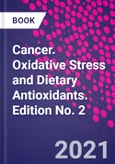Cancer: Oxidative Stress and Dietary Antioxidants, Second Edition, covers the science of oxidative stress in cancer and the potentially therapeutic usage of natural antioxidants in the diet or food matrix. The processes within the science of oxidative stress are described in concert with other processes, such as apoptosis, cell signaling, and receptor-mediated responses. This approach recognizes that diseases are often multifactorial and that oxidative stress is a single component. Other sections cover new organ site tumors-skin and liver cancer, the role of polymorphisms, cytochrome p450s, COX gene, fatty acids, apoptosis, T cells and mitochondria, prevention/protection with anthocyanins, esculetin, nanoparticles, and more.
This book is a valuable resource for cancer researchers, oncologists, nutritionists and other members of the biomedical field who are interested in enhancing treatment outcome, improving the quality of life of patients, and developing new treatments in the fight against cancer.
Please Note: This is an On Demand product, delivery may take up to 11 working days after payment has been received.
Table of Contents
Section 1 Oxidative Stress and Cancer1. Paraoxonases, Oxidative stress and Breast cancer2. Oxidative stress and prostate cancer3. Oxidative stress in lung cancer4. Endogenous antioxidants in the prognosis and treatment of lung cancer5. Oxidative stress in stomach cancer6. Oxidative stress and oral cavity cancer7. Oxidative stress, Epigenetics and Bladder Cancer8. Linking oxidative stress and ovarian cancers9. Oxidative stress in viral carcinogenesis10. Polymorphisms, antioxidant genes and cancer11. Interlinking high fat diets, oxidative stress, heart and carcinogenesis12. Maternal nutrition, antioxidant defenses and tumor-bearing offspring13. Inflammation and oxidatively induced DNA damage: A synergy leading to cancer development14. Ferroptosis, Free radicals and cancer15. Nrf2, YAP antioxidant potential and cancer16. Cancer, NF kappa B,and oxidative stress-dependent phenotypes17. 8-hydroxydeoxyguanosine and diabetic cancer patients
Section 2. Antioxidants and Cancer18. Molecular Approaches Toward Targeted Cancer Therapy with Some Food Plant Products: On the Role of Antioxidants and Immune Microenvironment19. Prostate Cancer and food-based antioxidants in India as plausible therapeutics20. Linking non-enzymatic antioxidants in the diet and colorectal cancer21. Fruit and vegetables juices and breast cancer22. N-3 fatty acids and oxidative stress in cancer23. Statins, cancer and oxidative stress24. Role of anthocyanins in oxidative stress and the prevention of cancer in the digestive system25. Caffeic Acid targets metabolism of cervical squamous cell carcinoma26. Caffeic acid, oxidative balance and melanoma cancer cells27. Oxidative stress and cancer: Antioxidative role of Ayurvedic plants28. Polyphenol chlorogenic acid, antioxidant profile and breast cancer29. Cinnamomum cassia, apoptosis, transcription 3 inactivation and reactive oxygen species in cancer studies30. Cocoa and anti- oxidative stress actions in colonic cancer31. Croton gratissimus, cancer and antioxidant activities32. Curcumin, oxidative stress and breast cancer33. Curcumin analogs, oxidative stress and prostate cancer34. Fern extract, oxidative stress and skin cancer35. Lycium barbarum (Goji berry), human breast cancer and antioxidant profile36. Manuka honey, oxidative stress, 5-fluorouracil usage and colon cancer cells37. Piplartine (piperlongumine), oxidative stress and use in cancer38. Antioxidant pleurotus ostreatus (Jacq.) P. Kumm and lymphoid cancer cells39. Skin cancer, polyphenols and oxidative stress40. Pterostilbene and cancer chemoprevention41. Resveratrol, reactive oxygen species and mesothelioma42. Exercise, Selenium and Cancer Cells43. Silybum marianum, antioxidant activity and cancer patients44. Terminalia ferdinandiana Exell. Fruit extracts, antioxidant profile, proliferation and cancer45. Uncaria tomentosa: a promising source of therapeutic agent for prevention and treatment of oxidative stress and cancer46. Pharmacologic vitamin C and use in cancer47. Antioxidant vitamins and genetic polymorphisms in breast cancer48. Antioxidant vitamins in acute lymphoblastic leukemia
Section 3. Online Resources49. Resources








